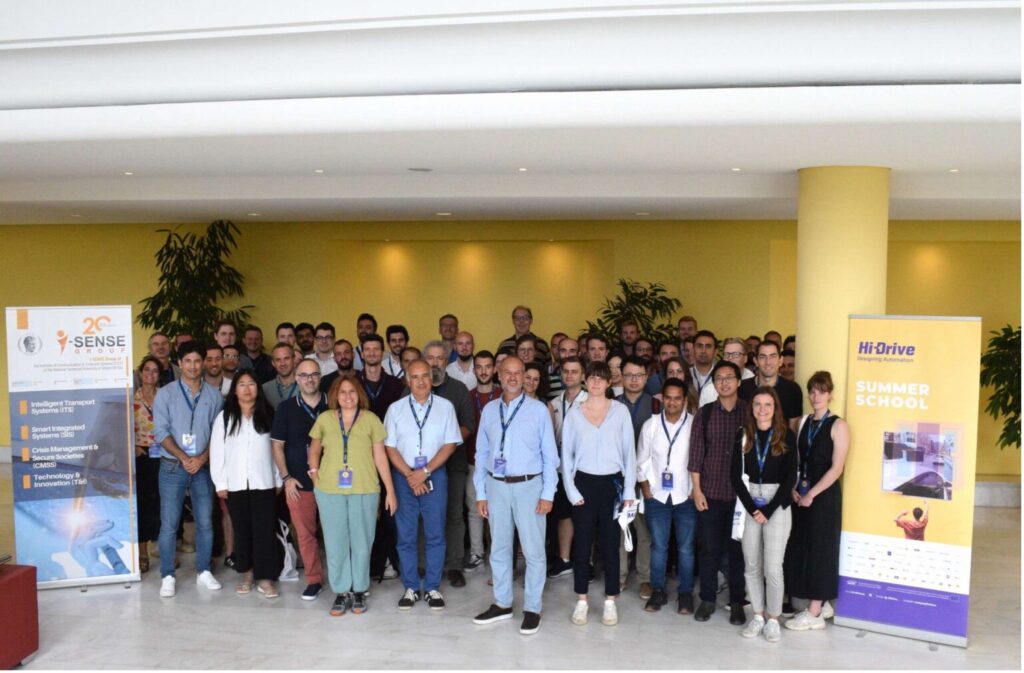The 1st Hi-Drive Summer School co-organised by the ISENSE Group of ICCS and the EU-funded project Hi-Drive successfully took place on September 06 -07 in Porto Heli. Despite the unforeseen delays caused by extreme weather conditions, our team has successfully organised the 1st Summer School of the flagship European Project Hi-Drive, focusing on ‘Driving towards the deployment of Higher Automation’ in Porto Heli on September 6 and 7, 2023.
More than 50 young researchers, PhD students, engineers and experts from all over Europe had the opportunity to follow four different sessions, where 14 distinguished speakers from Volkswagen and Mercedes Benz groups, leading European Universities, research institutes, etc., delivered lectures that unravelled the main challenges and latest developments in the theory and practice of Automated Driving Implementation and Testing.
Special focus was placed on three important pillars in the field, i.e. recent research results on multi-modal perception under adverse weather conditions and occlusions (Robust all-weather perception), on verification and validation activities of safety-critical complex systems such as ADAS-enabled vehicles, as well as the human factors aspects when evaluating automated driving systems (Testing and evaluation methodologies I & II) and finally, on the connection between research and regulatory deployment of CCAM applications (CCAM deployment in Europe: Applications and the emerging regulation landscape).
Following the introductory speeches by Hi-Drive’s coordinator, Aria Etemad (Volkswagen Group) and Dr Angelos Amditis, Hi-Drive Summer School organiser and R&D Director at ICCS, the program continued with the following lectures:
- Corner Cases and Occlusions in Environment Perception for Automated Driving
Jasmin Breitenstein, PhD Student Computer Vision, Technische Universität Braunschweig
- Artificial intelligence to improve vehicle vision for automated driving in poor visibility conditions – Overview and latest results from the AI-SEE project
Werner Ritter, Researcher and Senior Expert at Mercedes-Benz GA
- Robust Local and Collective Perception under Varying Weather Conditions
Georg Volk, Researcher at University of Tübingen, Dpt. of Computer Science, Embedded Systems
- All-weather capable and ODD defragmenting fine resolution radar for automated driving
Marc-Michael Meinecke, Senior Researcher at Volkswagen
- Evaluating Causal Effects of SOTIF Triggering Conditions
Christian Neurohr, Researcher at DLR, Systems Engineering for Future Mobility Institute
- The Hi-Drive Driving Scenario Database
Marcel Sonntag, Institute for Automotive Engineering, RWTH Aachen University
- Towards a quantitative SOTIF validation of Automated Driving Systems
Lina Putze, Researcher at DLR, Systems Engineering for Future Mobility Institute
- Recent advances on testing autonomous vehicle systems: an industry perspective
Jon Sadeghi, Senior Research Engineer at Five AI
- Safety Verification of Autonomous Vehicles via Edge Case Testing
Felix Feng – Imperial College London
- Simulating the Future of Automated Driving: Unveiling Human Factors Issues and Providing HCI Insights
Andreas Riener, Prof. for Human-Machine Interface and Virtual Reality, Technische Hochschule Ingolstadt
The Summer School concluded with a poster session and an opportunity for both speakers and participants to network and discuss with one another. More information about the Summer School is available on the project’s website here.
Our ISENSE Group team would like to thank everyone who attended this unique event and we are looking forward to organising the project’s next Summer School in 2024!
About the project
Hi-Drive brings together 53 partners from the automotive industry, research institutes and other relevant stakeholders under the common goal to tackle key challenges that are currently hindering the progress in vehicle automation and to push automated driving (AD) from SAE Level 3 further up toward higher levels of automation. The technologies developed will demonstrate the robustness and reliability of connected automated driving (CAD) functions in large-scale trials under diverse and challenging environments.


